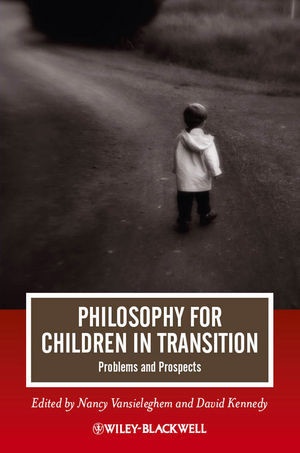Read more
Informationen zum Autor Nancy Vansieleghem is a Postdoctoral Researcher at the Department of the Foundations of Education at Ghent University. In her work, she explores alternative forms of educational practices and experiments in terms of actions that seek to address the forces of the market which exploit educational projects increasingly as consumer products. She is the author of Dialogue as Limit-Experience: A Portrait of Philosophy with Children as Educational Project (2010).David Kennedy is Professor of Educational Foundations at Montclair State University, and Fellow of the Institute for the Advancement of Philosophy for Children (IAPC). His publications include The Well of Being: Childhood, Subjectivity, and Education (2006) and Philosophical Dialogue with Children: Essays on Theory and Practice (2006), as well as numerous journal articles on philosophy of childhood and on theory and practice of community of philosophical inquiry with children. Klappentext Philosophy for Children arose in the 1970s in the US as an educational programme, initiated by Matthew Lipman (1922-2010), devoted to exploring the relationship between the notions of 'philosophy' and 'childhood'. The last 40 years have seen the programme spread globally, and the theory and practice of doing philosophy for or with children is now of growing interest in the field of education and, by implication, in society as a whole.This collection of papers, although widely diverse, focuses on the emergence of the concept 'philosophy/child', and more precisely, what determines its moment of emergence and the particular conditions of that emergence. Contributors, both educators and philosophers, establish the arguments that validate the relationship between philosophy and the child, and which clarify the significance of that relationship for teaching and learning today.In doing so, the book achieves two important goals: it familiarises an actual educational practice that is only now gaining importance in the field of academic philosophy; and secondly, it opens up discussion on the notion of the relationship between philosophy and the child 'after Lipman'. Zusammenfassung Philosophy for Children in Transition presents a diverse collection of perspectives on the worldwide educational movement of philosophy for children. Educators and philosophers establish the relationship between philosophy and the child, and clarify the significance of that relationship for teaching and learning today.* The papers present a diverse range of perspectives, problems and tentative prospects concerning the theory and practice of Philosophy for Children today* The collection familiarises an actual educational practice that is steadily gaining importance in the field of academic philosophy* Opens up discussion on the notion of the relationship between philosophy and the child Inhaltsverzeichnis Preface (PAUL STANDISH)Introduction: What is Philosophy for Children, What is Philosophy with Children--After Matthew Lipman? (NANCY VANSIELEGHEM and DAVID KENNEDY)1. The Experience of Childhood and the Learning Society: Allowing the Child to be Philosophical and Philosophy to be Childish (THOMAS STORME and JORIS VLIEGHE)2. Philosophy for Children and its Critics: A Mendham Dialogue (MAUGHN GREGORY)3. The Play of Socratic Dialogue (RICHARD SMITH)4. Childhood, Philosophy and Play: Friedrich Schiller and the Interface between Reason, Passion and Sensation (BARBARA WEBER)5. Transindividuality and Philosophical Enquiry in Schools: A Spinozist Perspective (JULIANA MERÇON and AURELIA ARMSTRONG)6. Community of Philosophical Inquiry as a Discursive Structure, and its Role in School Curriculum Design (NADIA KENNEDY and DAVID KENNEDY)7. The Provocation of an Epistemological Shift in Teacher Education through Philosophy with Children (JOANNA HAYNES and KARIN MURRIS)8. Philosophy, Exposure, and Children: How to Resist the Instrumentalisation of P...

